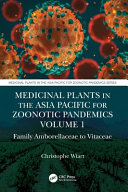
Medicinal Plants in the Asia Pacific for Zoonotic Pandemics, Volume 1: Family Amborellaceae to Vitaceae PDF
Preview Medicinal Plants in the Asia Pacific for Zoonotic Pandemics, Volume 1: Family Amborellaceae to Vitaceae
Medicinal Plants in the Asia Pacific for Zoonotic Pandemics provides an unprecedented, comprehensive overview of the phylogeny, botany, ethnopharmacology, and pharmacology of more than 100 plants used in the traditional medical systems of Asia and Pacific. It discusses their actions and potentials against viruses, bacteria, and fungi that represent a threat of epidemic and pandemic diseases, with an emphasis on the molecular basis and cellular pathways.
This book presents scientific names, the botanical classification, traditional medicinal uses, active chemical constituents, and pharmacology. This volume is a critical reference for anyone involved in the discovery of lead molecules or phytopharmaceutical products for the prevention or treatment of pandemic viral, bacterial, or fungal infections.
FEATURES
Phylogenetic presentation of medicinal plants and a chemotaxonomical rationale of antiviral, antibacterial, and antifungal actions
Discusses the chemical structure"“activity relationship, pharmacokinetics, and oral bioavailability of antimicrobial principles
Introduces the molecular mechanism of natural products on viruses, bacteria, and fungi
Contains a selection of botanical plates and useful bibliographic references
This book is a useful research tool for postgraduates, academics, and the pharmaceutical, herbal, and nutrition industries. Medicinal Plants in the Asia Pacific for Zoonotic Pandemics includes commentary sections that invite further research and reflection on the fascinating and timely subject of the development of drugs and herbals from Asia-Pacific medicinal plants to safeguard humanity and other life forms against the forthcoming waves of viral, bacterial, or fungal pandemics. This book is an ideal reference text for medicinal plant enthusiasts.
